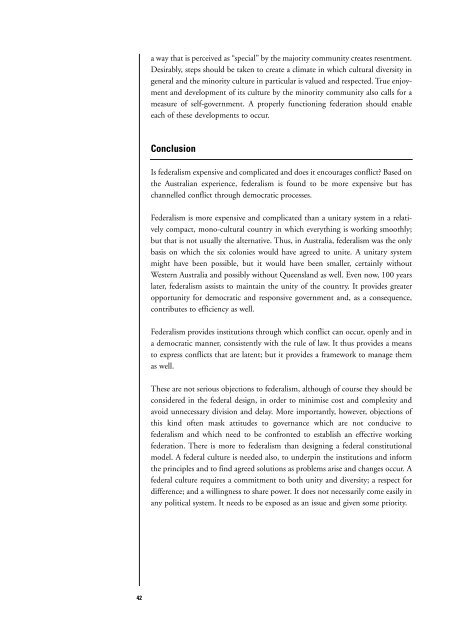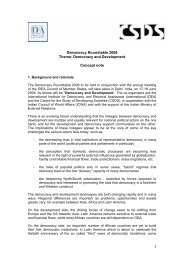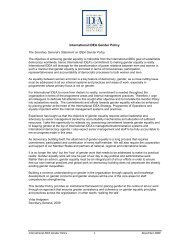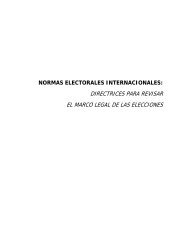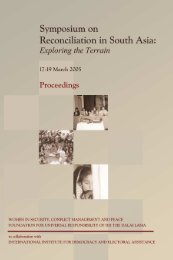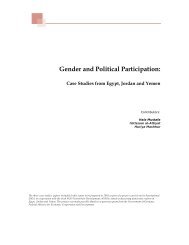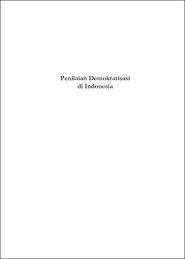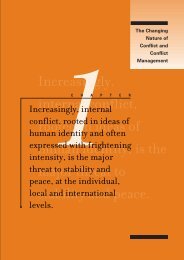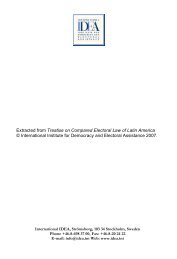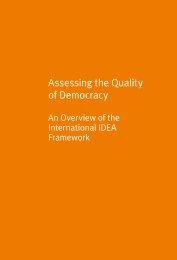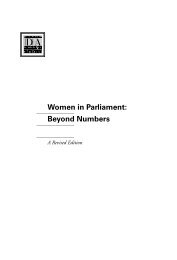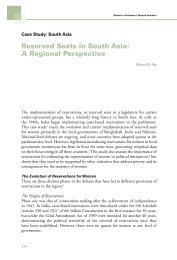The Role of State Constitutions in Protecting ... - International IDEA
The Role of State Constitutions in Protecting ... - International IDEA
The Role of State Constitutions in Protecting ... - International IDEA
Create successful ePaper yourself
Turn your PDF publications into a flip-book with our unique Google optimized e-Paper software.
a way that is perceived as “special” by the majority community creates resentment.<br />
Desirably, steps should be taken to create a climate <strong>in</strong> which cultural diversity <strong>in</strong><br />
general and the m<strong>in</strong>ority culture <strong>in</strong> particular is valued and respected. True enjoyment<br />
and development <strong>of</strong> its culture by the m<strong>in</strong>ority community also calls for a<br />
measure <strong>of</strong> self-government. A properly function<strong>in</strong>g federation should enable<br />
each <strong>of</strong> these developments to occur.<br />
Conclusion<br />
Is federalism expensive and complicated and does it encourages conflict? Based on<br />
the Australian experience, federalism is found to be more expensive but has<br />
channelled conflict through democratic processes.<br />
Federalism is more expensive and complicated than a unitary system <strong>in</strong> a relatively<br />
compact, mono-cultural country <strong>in</strong> which everyth<strong>in</strong>g is work<strong>in</strong>g smoothly;<br />
but that is not usually the alternative. Thus, <strong>in</strong> Australia, federalism was the only<br />
basis on which the six colonies would have agreed to unite. A unitary system<br />
might have been possible, but it would have been smaller, certa<strong>in</strong>ly without<br />
Western Australia and possibly without Queensland as well. Even now, 100 years<br />
later, federalism assists to ma<strong>in</strong>ta<strong>in</strong> the unity <strong>of</strong> the country. It provides greater<br />
opportunity for democratic and responsive government and, as a consequence,<br />
contributes to efficiency as well.<br />
Federalism provides <strong>in</strong>stitutions through which conflict can occur, openly and <strong>in</strong><br />
a democratic manner, consistently with the rule <strong>of</strong> law. It thus provides a means<br />
to express conflicts that are latent; but it provides a framework to manage them<br />
as well.<br />
<strong>The</strong>se are not serious objections to federalism, although <strong>of</strong> course they should be<br />
considered <strong>in</strong> the federal design, <strong>in</strong> order to m<strong>in</strong>imise cost and complexity and<br />
avoid unnecessary division and delay. More importantly, however, objections <strong>of</strong><br />
this k<strong>in</strong>d <strong>of</strong>ten mask attitudes to governance which are not conducive to<br />
federalism and which need to be confronted to establish an effective work<strong>in</strong>g<br />
federation. <strong>The</strong>re is more to federalism than design<strong>in</strong>g a federal constitutional<br />
model. A federal culture is needed also, to underp<strong>in</strong> the <strong>in</strong>stitutions and <strong>in</strong>form<br />
the pr<strong>in</strong>ciples and to f<strong>in</strong>d agreed solutions as problems arise and changes occur. A<br />
federal culture requires a commitment to both unity and diversity; a respect for<br />
difference; and a will<strong>in</strong>gness to share power. It does not necessarily come easily <strong>in</strong><br />
any political system. It needs to be exposed as an issue and given some priority.<br />
42


